Recipes / Mediterranean Islands
Bring me sunshine
Try these delicious dishes from Mediterranean islands and feel the sun’s warmth in every mouthful.

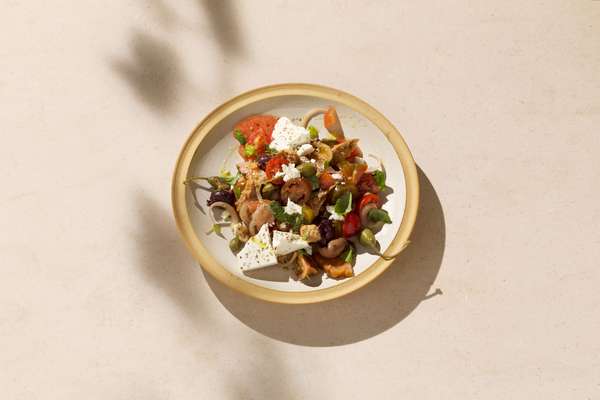
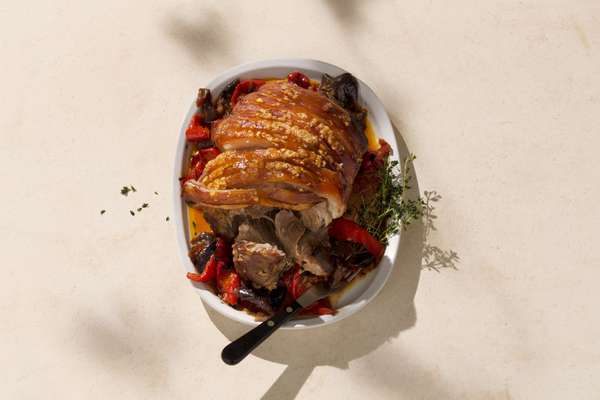
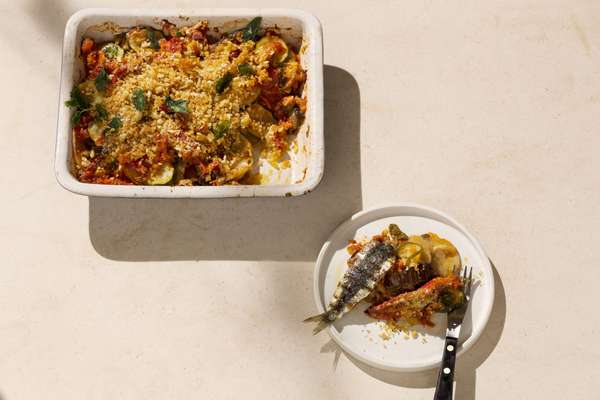

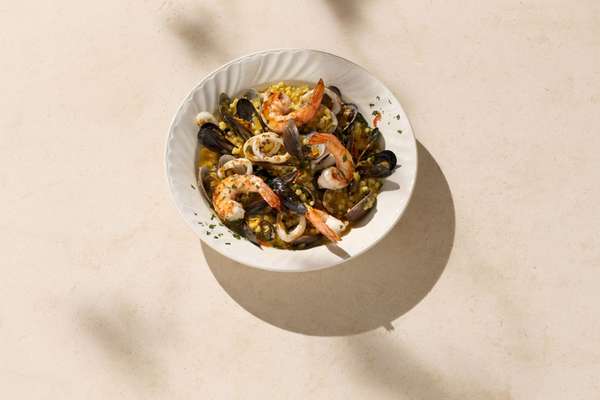
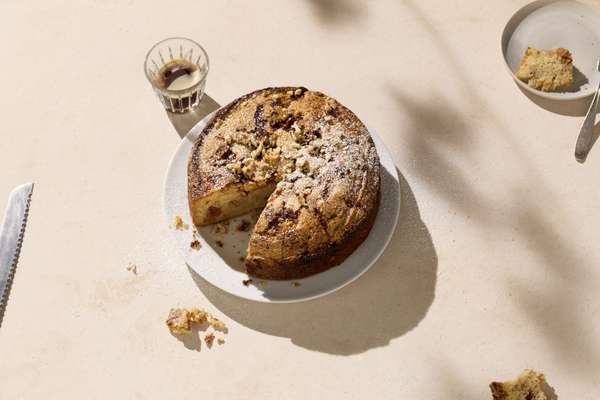
Recipes & food styling: Georgina Hayden
Prop styling: Linda Berlin
Food assistant: India Whiley-Morton

Pasta alla Norma: spaghetti with aubergine, tomato and basil
Sicily
Serves 4
This Sicilian classic packs the region’s freshest seasonal produce onto a single sumptuous plate or bowl with glossy aubergines, juicy tomatoes, fresh basil and lightly salted ricotta. The story goes that after each performance of Catanian composer Vincenzo Bellini’s opera Norma at the Bellini theatre, the company was served pasta alla Norma. It’s comfort food fit for the grandest occasion (as well as the humblest).
2 aubergines, cut into 2cm cubes
1 tsp sea salt
½ bunch of basil
2 garlic cloves, peeled and sliced
Olive oil
Pinch of dried chilli flakes
400g tin of tomatoes
1 tbsp red-wine vinegar
380g spaghetti
40g salted ricotta
1. Put the aubergines into a colander and sprinkle over a teaspoon of sea salt. Leave colander in the sink for 30 minutes.
2. Pick the basil leaves, set aside and chop the stalks. Heat some olive oil in a pan. Fry the garlic and basil stalks for 1 to 2 minutes until lightly golden, then add the chilli and tomatoes. Break the tomatoes up with a wooden spoon, add a splash of water and reduce the heat to low. Cook for 15 minutes then set to one side.
3. Put a large frying pan on a medium-low heat. Drizzle in olive oil and fry the aubergine in batches, for 8 to 10 minutes, until golden. Stir the aubergine and red-wine vinegar into the tomato sauce. Add salt to taste.
4. Meanwhile, bring a large pan of salted water to the boil. Cook the spaghetti according to the packet instructions (about 9 minutes). When it is al dente, reserve a mugful of the pasta water then drain the spaghetti. Add the pasta to the tomato sauce with half the reserved water and toss together well. Tear in most of the basil leaves and grate in most of the salted ricotta. Add more water if needed. Serve straight away, finished with the extra basil leaves and ricotta.

Dakos salad: tomato and bread salad
Crete
Serves 4 to 6
Dakos is a traditional Cretan dish of crisp barley bread topped with crushed tomatoes, crumbled mizithra cheese and olive oil. Tomatoes are the star so you want them to be as vine-fresh as you can find. If you’re not fortunate enough to live in Greece, where sun-ripened tomatoes grow aplenty, you can embellish the dish with an extra dash of sugar or balsamic vinegar.
½ red onion, peeled and finely sliced
1 tbsp red-wine vinegar
400g ripe tomatoes, a mixture of sizes, roughly chopped
12 black olives, pitted and roughly chopped
6 dakos or wholemeal crispbreads
2 tbsps caperberries
2 tbsps extra virgin olive oil
Few sprigs of basil
Few sprigs flat-leaf parsley, roughly chopped
Sea salt and freshly ground black pepper
125g feta
½ tsp dried oregano
1. Put the red onion in a large mixing bowl with the red-wine vinegar and leave to one side for 5 minutes.
2. Once the red onion has softened, add the tomatoes and olives to the bowl and crumble in the dakos or crispbreads. Add the caperberries and extra virgin olive oil. Tear in the basil leaves. Add the parsley to the bowl then season to taste. Crumble the feta over the top and scatter on the oregano to serve.

Pebronata: slow-cooked pork shoulder with thyme and peppers
Corsica
Serves 6 to 8
Can’t escape to Corsica? Then bring the taste of the idyllic island home. Pour yourself a glass of Clos Canarelli while you’re roasting the pork shoulder to perfection and be generous with the thyme (and time) to give this traditional dish its unctuous punch. It’s a meal ideal for a dinner party with good (meat-eating) friends.
2.5kg pork shoulder, boned, rolled and scored
2 red onions, peeled and cut into wedges
4 garlic cloves
½ bunch or 10g lemon thyme
6 juniper berries, crushed
¼ tsp each of sea salt and ground black pepper
Olive oil
250ml white wine
300ml chicken stock
2 400g tins of tomatoes
3 red peppers, cut into 1cm to 2cm-wide strips
2 tbsps red-wine vinegar
1. Take the pork out of the fridge 15 minutes before cooking. Preheat the oven to full whack, ideally 240c. While it heats up, prepare the onions and crush the garlic cloves with the side of a knife.
2. Put the pork in a roasting tray and nestle the onions and garlic around it. Pick over the lemon thyme leaves, mix with the crushed juniper berries and sprinkle over the pork along with the salt and pepper. Drizzle the pork with olive oil and pour the white wine and stock into the tray. Roast for 25 minutes, until the pork skin has crackled nicely.
3. Remove the tray from the oven. Stir the tomatoes into the stock then cover the tray with foil, sealing the edges tightly. Pop back in the oven at 160c. After 2 hours, stir the red peppers into the base, baste the pork and re-cover. Roast for a further 2 hours. If it isn’t tender yet, continue to cook, covered, for a further 30 to 45 minutes.
4. When the pork is ready turn the oven back up to 240C for 15 minutes so that the crackling is crisp.
5. Remove the pork and let it rest, loosely covered with foil, for another 15 minutes. Stir the red wine vinegar into the sauce. Slice or pull apart the pork with two forks and serve with the sauce.

Tumbet: layered Mediterranean vegetables with zesty breadcrumbs
Mallorca
Serves 6 as a side
This vegetable bake is reminiscent of French ratouille or Spanish pisto but with a handful of breadcrums fresh oregano and lemon zest, it's unmistakbly a tumblet. Simple and straightforward to prepare, this dish is all about the sun-ripened seasonal produce and is the perfect acccompaniment to grilled sardines.
1 aubergine
Olive oil
4 garlic cloves, peeled and sliced
600g ripe tomatoes, chopped
1 tbsp tomato purée
2 medium potatoes, cut into ½cm-wide slices
2 courgettes, sliced lengthways
1 jar of roasted red peppers, roughly sliced
Few sprigs of fresh oregano
Handful of fresh breadcrumbs
Zest of 1 lemon
Preheat oven to 200C. Prick the aubergine all over with a sharp knife. Rub with a little olive oil, place in a small dish and roast in the oven for 45 minutes. Leave to cool.
Meanwhile prepare the garlic and tomatoes. Place a saucepan on a medium-low heat and drizzle in a good glug of olive oil. Fry the garlic until golden, then add the tomato purée and stir for 1 minute. Add the tomatoes and cook for 5 minutes, stirring often. Add 250ml water and bring to the boil. Reduce heat and simmer for 15 minutes. If the mixture is too thick, top with a little boiling water to make a sauce. Add salt to taste.
While the sauce cooks, fry the potato slices in a non-stick pan in a little olive oil for 8 to 10 minutes until golden (you’ll probably need to do this in batches). Heat a griddle pan. Toss the sliced courgette in 1 tbsp of oil then griddle for a few minutes on each side. Cut the cooled aubergine into thin slices.
Lay half the potato slices in the bottom of an 18cm 3 25cm ovenproof dish. Place half of the aubergine on top. Drizzle with olive oil, season and scatter over one third of the oregano leaves. Top with half of the courgette and half of the red-pepper strips, then spoon over half the tomato sauce.
Repeat the layers. Finish by scattering over the breadcrumbs, lemon zest and remaining oregano, and another drizzle of olive oil. Cover the dish with foil and put in the oven for 45 minutes. Remove the foil, drizzle with more olive oil and bake for a further 30 minutes.

Ensalada payesa: new potato and egg salad
Ibiza
Serves 4
Ibiza has more to offer than late nights and Balearic beats – take this traditional dish, for example. The island is embracing the farm-to-table movement and so are we with this refreshing and satisfying salad made with new potatoes, gem lettuce, eggs and olives. Whether served as a starter or light lunch, this recipe is an excellent addition to your culinary arsenal.
300g new potatoes, washed and cut into even-sized chunks about 3cm big
4 large eggs
3 tbsps extra virgin olive oil
Juice of 1 lemon
12 large green olives, pitted and roughly chopped
4 spring onions, trimmed and finely sliced
½ bunch flat-leaf parsley, chopped
2 little gem lettuces, trimmed and sliced into thin wedges
1 green pepper, halved and finely sliced
Handful of freshly podded peas
Salt and freshly ground black pepper
1. Bring a large saucepan of water to the boil. Place the potatoes in the boiling water and add the eggs. Boil the eggs for 7 minutes, then remove from the water. Boil the potatoes for a further 3 to 5 minutes until cooked through, then drain and leave to steam dry. Place the potatoes in a large mixing bowl and dress with the extra virgin olive oil. Add the lemon juice. Toss together and leave to one side.
2. Prepare the olives, spring onions, flat-leaf parsley, lettuces, peppers and peas. Toss everything together with the potatoes and season generously.
3. Peel the eggs, cut into quarters and serve on top of the salad.

Fregola a pesce: pasta with seafood and saffron
Sardinia
Serves 6
A mouthwatering Sardinian dish that transports you to the Mediterranean seashore. The saffron – that most valuable of spices – gives the fregola (a bead-shaped dried and toasted pasta) an earthy flavour. This recipe reflects Sardinia’s maritime past in a manner likely to tempt tasters to the shore to enjoy it.
Olive oil
1 large onion, peeled and finely chopped
4 garlic cloves, peeled and finely chopped
1 red chilli, deseeded and finely sliced
400g fregola or large couscous
250ml dry white wine
500ml fish stock
Good pinch of saffron
2 squid tubes, cut into rings
12 king prawns, butterflied
Freshly ground black pepper
1kg clams or mussels
Juice of 1 lemon
½ bunch parsley, roughly chopped
1. Place a wide sauté or saucepan on a medium-low heat and pour in a good glug of olive oil. Add the onion, garlic and chilli and sauté for 5 minutes. Meanwhile bring a large pan of salted water to the boil and cook the fregola or couscous according to packet instructions so it is al dente, then drain and keep to one side.
2. After 5 minutes add the wine to the onion, garlic and chilli, turn up the heat and bring it to the boil. Once the wine has reduced by more than half, add the stock and saffron to the pan. Bring to the boil again, then reduce the heat and simmer for 15 minutes or so, until the liquid has reduced by two thirds and is just starting to thicken.
3 While the base is cooking, prepare the seafood. Toss the squid rings and prawns in olive oil with a pinch of freshly ground black pepper. Place a griddle pan on a high heat and sear the seafood for 4 to 5 minutes, until cooked through and charred.
4. Clean and wash the clams or mussels, discarding any opened ones. Add to the reduced stock mixture, cover with a lid and cook for 3 minutes or until opened (discard any that don’t open).
5. Stir the cooked fregola into the stock and scatter the charred squid and prawns on top. Season everything with black pepper and stir in the lemon juice. Finish with the parsley and serve straight away.

Milopita: apple and brandy cake
Cyprus
Serves 12
Milopita is the Greek name for apple cake and it’s beloved throughout Cyprus. Legend has it that the word milo comes from a fellow named Milos, who travelled to Cyprus and befriended the king. To show his appreciation, the king presented Milos with a wife: Pelia. The two fell in love but, upon the death of the king, Milos hung himself from a tree and Pelia followed suit. The goddess Aphrodite, touched by their love, transformed Milos into an apple (and Pelia – somewhat bafflingly – into a pigeon). Not to worry: this cake is more uplifting than the tale, especially with a generous shake of cinnamon.
Knob of butter
3 apples, about 375g, peeled, cored and cut into 1cm to 1.5cm pieces
1 tbsp ground cinnamon
½ tsp mixed spice
400g caster sugar
375g self-raising flour
1 tsp baking powder
Good pinch of fine sea salt
4 large eggs
200ml olive oil
80ml brandy
25g walnuts, roughly chopped
1 to 2 tbsps icing sugar
1. Grease and line the base of a 23cm springform cake tin. Preheat your oven to 180C.
2. Place the apples in a mixing bowl with the cinnamon, mixed spice and 25g of the caster sugar. Leave to one side.
3. In a large mixing bowl whisk together the flour, baking powder, sea salt and remaining 375g of caster sugar. Make a well in the centre and crack in the eggs, then pour in the olive oil and brandy. Whisk everything until it comes together, then pour half of the mixture into the cake tin. Evenly spoon over two thirds of the apple mixture. Top with the remaining cake mixture and then finish with the remaining apple, and any juices left in the bottom of the bowl.
4. Put the cake in the oven and bake for 1 hour to 1 hour and 10 minutes, until cooked through. Leave to cool in the tin for 10 minutes then transfer to a cooling rack. Scatter the walnuts over the top. Sift over the icing sugar and serve.


